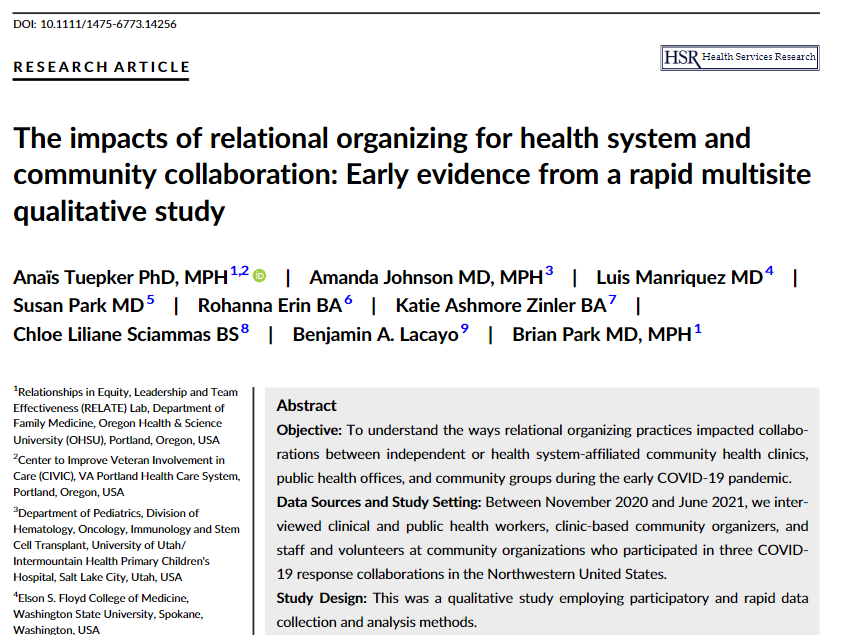Academic Papers.
-

Clinic-based organizing builds community power
Our HEAL program embeds organizing into the healthcare setting and has created change in local clinical practice and quality improvement efforts as well as local and state-wide policy change that improve conditions for systemically harmed communities.
-

Community Organizing for Health Justice: A Missing Link for Health Care
Community organizing - like our HEAL program - offers a framework to address the gap in power that drives structural health inequities. Learn about three important principles that health systems should integrate into their approach to addressing these gaps: shifting power, centering lived expertise, and solidarity.
-

The Transformational Power of Storytelling
Healthcare has increasingly embraced storytelling, acknowledging its vital role in addressing burnout, nurturing resilience, and driving behavior change. Read examples of how clinicians are using storytelling practices.
-

RLI participants experience improvements in well-being
We found significant improvements in RLI participant well-being after the course, and these improvements remain at 6-months post-program.
-
Relational organizing supports health system and community collaboration
Relational organizing contributes to greater self-efficacy in a time of crisis, an enhanced sense of connection, and ultimately a sense of successful collaboration between community health clinics, public health offices, and community groups.
-

What are the impacts of relational leadership practices for health care? A Scoping Review
The presence of relational leadership practices has been consistently associated with positive outcomes including reduced burnout, improved employee engagement, improved well-being, and improved communication. These outcomes in turn have been associated with downstream effects of lowered outpatient costs, improved patient quality care measures, and improved health outcomes.
-
Relational Organizing within Healthcare Organizations
We have embedded a relational community organizer within health care to advance health equity. Learn how relational organizing during COVID-19 contributed to the alignment between cross-sectoral groups that was key to success. See Chapter 1, pages 62-77.
-

Leading through (and beyond) COVID-19 in Primary Care
As the burnout and workforce crises have accelerated, we have identified strategies can be useful to leaders to support teams and build organizational resilience in primary care moving forward.
-

An antidote to what’s ailing healthcare workers: a new (old) way of relational leadership
Our research team found participants in the Relational Leadership Institute had greater self-awareness, deeper understanding of others, and increased confidence in supporting others, building relationships & making positive changes on their teams.
-

Co-Creating a Thriving Human-Centered Health System in the Post-Covid-19 Era
Organizational development research points to evidence-based leadership actions during the tail of the pandemic that could not only promote well-being in the short term but also imprint more permanently into the culture of the health care system.
-

Reimagining Relationship-Based Health Care in a Post-COVID World
We have an opportunity to reimagine visits entirely—both office-based and virtual—and leverage technology to transform a unidirectional model into one that values relationships as critical facilitators of health and well-being for both patients and providers.


